Английская лексика на тему музыки
1. Questions about music
Do you like music? — Вы любите музыку?
Can you play any instrument? — Ты умеешь играть на какому-нибудь инструментах?
Do you like singing? — Ты любишь петь?
What is your favourite type of music? — Какая ваша любимая музыка?
What genre of music do you listen to? — Какой жанр музыки ты слушаешь?

2. Actions
to sing along
to sing karaoke
an earworm — навязчивая мелодия
It’s just an earworm. — Это просто навязчивая мелодия.
to get stuck in your head
to have taste in music — иметь вкус к музыке
to be tone deaf — медведь на ухо наступил (быть глухим)
set my favourite song as a ringtone — установить мою любимую песню в качестве мелодии звонка
to own a lot of vinyl — иметь много виниловых пластинок
to own a lot of records — иметь много записей
to own a lot of physical albums — иметь много альбомов (физических альбомов)
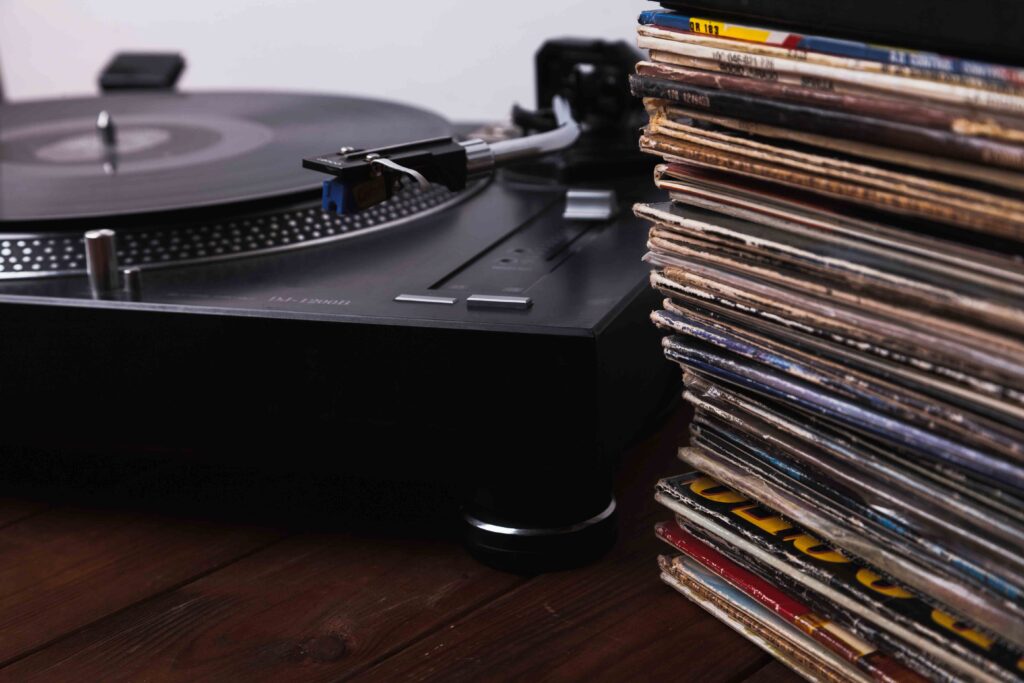
3. Words to describe the type of music
fast tempo — быстрый темп
The song is so upbeat.
a complex song — сложная песня
heavy music — тяжелая музыка
loud music — громкая музыка
relaxing music — расслабляющая музыка
soft music — мягкая музыка
piercing music — пронзительная музыка
hurt your ears — навредить твоим ушам
rhythmic music — ритмичная музыка
uplifting music — воодушевляющая музыка
melancholic music — меланхолическая музыка
catchy music — запоминающаяся музыка
lively music — живая музыка
harmonic music — гармоническая музыка
make you fell better (happier) — делать тебя счастливее, чувствовать себя лучше
It has a pleasing melody. — У него приятная мелодия.
That sounds awful. — Это звучит ужасно.
It makes my ears hurt. — У меня болят уши.
That’s too much of noise than music. — Это шум, а не музыка.
It heals. — Она исцеляет.
It stirs up my imagination. — Она будоражит мое воображение.
It’s rejuvenating. — Она делает моложе.

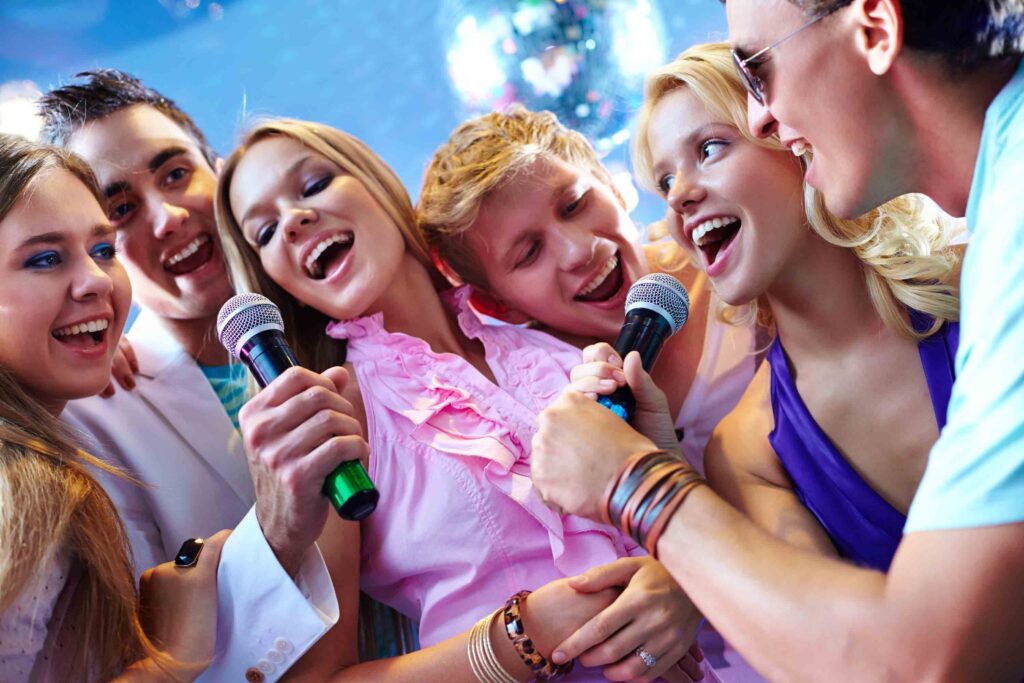
4. Концерты
a concert — концерт
a gig — концерт
live show — прямой эфир

5. Люди
a musician — музыкант
a band — музыкальная группа
women performers — женщины-исполнители
a vocalist — вокалист
a singer — певец
an artist — исполнитель
a music lover — любитель музыки
a music buff — любитель музыки
a music expert — музыкальный эксперт
to pick certain tunes — выбирать определенную мелодию
to develop a deeper understanding of music — развить более глубокое понимание музыки
to explore different genres of music — исследовать разные жанры музыки
an album — альбом
a record — запись
vinyl — виниловая пластинка
a vinyl lover — любитель виниловых пластинок
CD
physical music
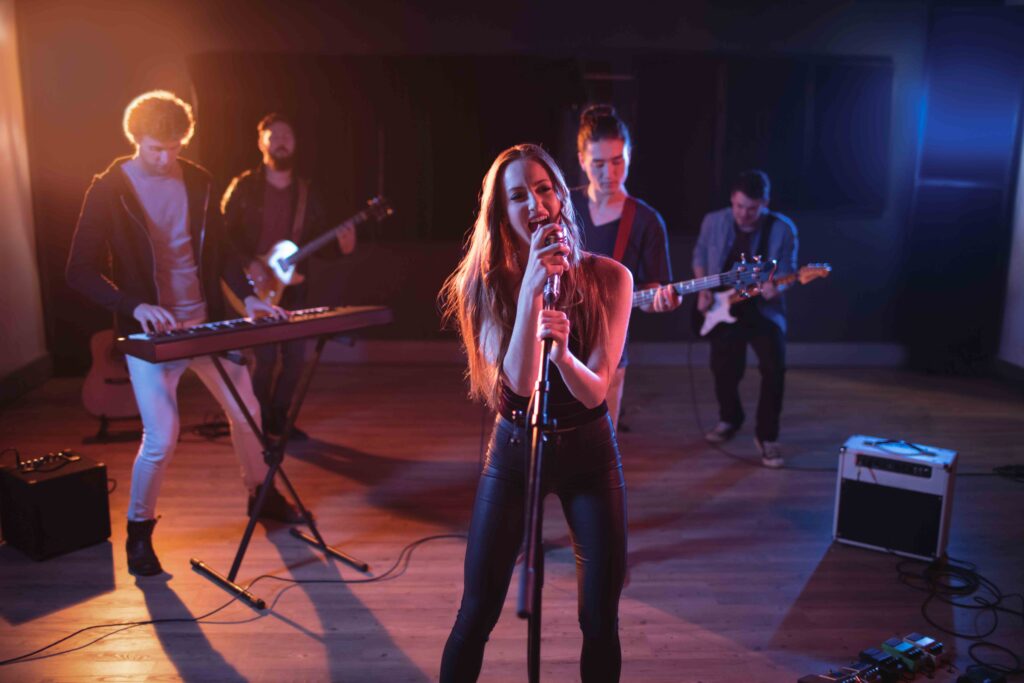
6. Составляющие музыки
a tune — мелодия
to play a tune — сыграть мелодию
rhythm — ритм
a good track (song) — хороший трек (песня)
catchy beat — запоминающийся ритм
to like a beat of that song — любить ритм этой песни
fast tempo — быстрый темп
slow tempo — медленный темп
the sense of rhythm — чувство ритма
a downtempo song — тихая (спокойная) песня
7. Успех
a record label — звукозаписывающая компания, студия звукозаписи
a small record label — небольшая студия звукозаписи
to have a massive hit — иметь огромный успех
to have a huge (giant) following/fan base — иметь огромную (гигантскую) базу подписчиков / фанатов
to getting signed by a record label — подписать контракт с лейблом
Many girls are head over heels in love with him. — Многие девушки по уши влюблены в него.
head over heels — по уши
8. Top 10 genres of Music Industry
8.1. Electronic Dance Music — Электронная танцевальная музыка
be produced by DJs
add dozens of tones to a piece to create unique music
hear them in clubs
was known in the form of Jamaican dub music
8.2. Rock Music
has been rocking the world since the 1950s
started actually around string instruments
Its loud and strong beats make it popular among the youths.
Rock bands:
Metallica, Pink Floyd, Nirvana, The Doors
8.3. Jazz
has its roots both in the West African and European culture
Originating in the late 19th to early 20th century.
Women performers:
Ella Fitzgerald, Betty Carter, Abbey Lincoln and Ethel Waters
8.4. Dubstep — Дабстеп
falling in the electronic music genre
8.5. Rhythm and Blues — Ритм-энд-блюз
Vocalists:
Rihanna, Mariah Carey, Beyoncé, Usher and the legendary Michael Jackson
be a combination of hip hop, funk, dance, pop and soul focusing on themes like relationships and freedom
8.6. Techno — Техно
the use of technology today has greatly enhanced the quality of techno style music and popularizing it among people day by day
8.7. Country Music — Кантри-музыка
to be a popular genre of American music which originated in the 1920s
having its roots from American folk and western music
using simple forms of instruments ranging from electric and steel guitars to drums and mandolin or mouth organ
Music singers:
Kenny Rogers, Shania Twain, Johnny Cash Taylor Swift
8.8. Electro — Электро
It is a blend of hip hop and electronic music. — Смесь хип-хопа и электронной музыки.
using a drum machine, vocoder and talkbox
Notable artists who have been into this form of music:
Arthur Baker, Freeez, Man Parrish and Midnight Star
8.9. Indie Rock — Инди-рок
It was originated in the 1980s and has gradually changed the music industry.
8.10. Pop Music — Поп-музыка
This form can include any form of music ranging from urban and dance to rock, country and Latin.
Instruments highly used are electric guitars, synthesizer drums as well as bass.
8.11. Classical Music
J.S. Bach — St Matthew Passion
Tchaikovsky — Symphony No. 6
Beethoven — Grosse Fuge
Mozart — Requiem
8.12. K-pop
Kpop is Korean popular music.
9. Types of musical instruments
9.1. Percussion instruments — Ударные инструменты
the piano, the xylophone, the cymbals
9.2. Wind instruments — Духовые инструменты
the saxophone, the flute, the trumpet, the clarinet
9.3. Stringed instruments — Струнные инструменты
the guitar, the violin, the cello
9.4. Electronic instruments — Электронные инструменты
the Xth Sense
9.5. Membranophones — Мембранофоны
Cylindrical drums, barrel drums, hourglass drums
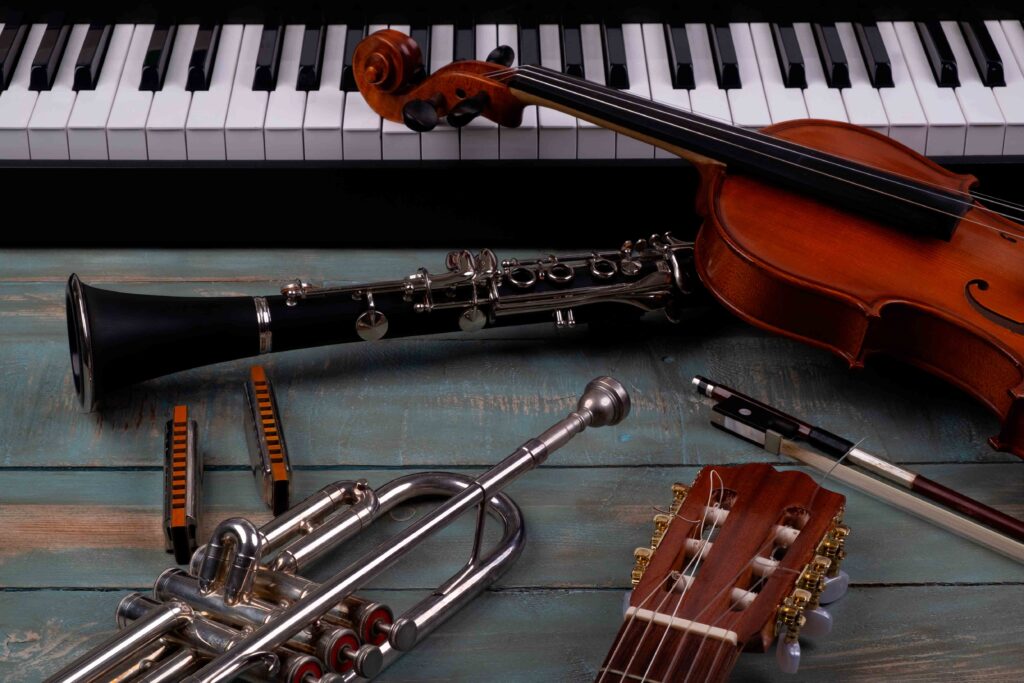
10. Apps for listening to music
Amazon Music (free/subscription)
Spotify (free/subscription)
Apple Music (subscription)
YouTube Music (free/subscription)
Bandcamp (individual purchases)
Shazam (free)
11. Benefits of Learning a Musical Instrument
11.1. Creativity
produce your music out of artistry
11.2. Memory Skills
can help exercise your brain
11.3. Boosts Your Confidence
need to perform in front of your fellow students, teachers, or family and friends
11.4. Coordination Skills
stimulating your brain and body to communicate with your mind, hands, and eyes
11.5. Maths
enhancing the sense of rhythm, beat, and scale. These are critical factors that stimulate your problem-solving skills.
11.6. Improved Academic Achievements

Репетитор английского языка
This article will provide you with an enormous collection of words to describe music. Music offers so much delight to life, whether you make it or listen to live or musical recordings.
And, while the English language is vast and diverse, what words do we use to describe music? There is a large music vocabulary that may be used to describe the ideas and feelings that music might evoke in us.
As you can see, there are numerous words that have similar meanings or may be used in multiple settings, such as the genre, a specific piece of music, our viewpoint, and how it makes us feel.
So without any further ado, let us go through the music words we have picked for you.
Music Words That Start with A
Here are some musical terms that begin with the letter A. You will be able to explain yourself clearly and rationally if you utilize these phrases to describe music.
- Ambient
- Anthem
- Air
- Avant-garde
- Ariose
- Assonance
- Accompaniment
- Airy
- Atmospheric
- Aria
- Arioso
- Acoustic
Music Words That Start with B
If you want to go more technical with music words, you may use some of the musical terms listed below to explain it. Here are some musical terms that begin with the letter B.
- Breathy
- Banging
- Beat
- Bop
- Bright
- Breath
- Bell-like
- Background
- Booming
- Bombastic
- Boomy
- Bass
- Baroque
Music Words That Start with C
Sometimes music is so lovely that words fail to do it justice. The reality is that your language runs dry from time to time, and there are a plethora of terms to describe music that can function like a perfect pitch. Here are some musical terms that begin with the letter C.
- Chime
- Consonant
- Cheerful
- Call
- Classical
- Choral
- Cappella
- Canticle
- Canorous
- Chant
- Carol
- Clear
- Chorale
- Contemporary
- Catchy
- Chamber
- Cadence
- Chorus
Music Words That Start with D
If you’re at a loss for words to explain music, don’t worry; it happens to the best of us; music talks to the heart and soul in a different language. We’ve prepared a collection of music-related terms that begin with D that you may use in person, online, or wherever you see fit.
- Danceable
- Dynamic
- Descant
- Deep
- Dramatic
- Ditty
- Dulcet
Music Words That Start with E
English is a language that never ceases to amaze. It has a good number of music terms that begin with E that may be used to describe music.
- Evergreen
- Eclectic
- Entertaining
- Electronic
- Experimental
- Euphonic
- Euphonious
- Evensong
- Explosive
- Energetic
Music Words That Start with F
Don’t go along with the crowd: the phrases you wish to express should be unique and memorable in order to represent what makes you unique. Here are some music terms that begin with F that you might enjoy.
- Fast
- Flawless
- Fluid
- Forte
- Fusion
- Funky
- Fugue
- Full
- Fresh
- Full-toned
- Facile
Music Words That Start with H
Let’s look at some alternative adjectives to define music based on style, melody/tempo, lyrics, and performer performances.
- Homophonic
- Happy
- Hit
- High-sounding
- Hypnotic
- Hymn
- Hyped
- Healing
- Harmonic
- High-flown
- Honeyed
- Headbanging
- Harmonious
- Heroic
- Hook
Music Words That Start with I
Here are some musical terms that begin with the letter I. You can use any of these lovely words to describe music or any part of it that you enjoy and value.
- Intonation
- Intricate
- Intro
- Inflection
- Improvised
- In
- Instrumental
Music Words That Start with J
Here are some musical terms that begin with the letter J. We’re confident that after you’ve chosen the proper term and shared your experience with it, the person with whom you’re chatting will have a far better grasp of what you’re trying to communicate.
- Jazzy
- Jaunty
- Jam
Music Words That Start with L
Music may be found anywhere. We may hear it on the streets, in the mall, in our neighborhoods, and through our devices—music is a part of our everyday life. Music appears to have made the world a better place. If you enjoy music, you’ll enjoy these music terms that begin with L.
- Lilting
- Lay
- Lyric
- Lofty
- Liquid
- Live
- Light
- Lied
- Lilt
- Lyrical
- Lively
Music Words That Start with M
Music allows us to communicate our thoughts and feelings. Sometimes we need to explain music for many reasons, both in writing and for other technical reasons. Here are some musical terms that begin with the letter M.
- Musical
- Masterful
- Melody
- Modern
- Musicality
- Melodious
- Mellifluous
- Muzak
- Major
- Magniloquent
- Minor
- Mellow
- Monophonic
- Melodic
Music Words That Start with O
Describing music is difficult, especially when we don’t know enough terminology linked to music, music styles, and phrases. Here are some words and phrases that may be used to describe music, sounds, and other musical terminology.
- Ode
- Opera
- Orchestral
- Orotund
Music Words That Start with P
We can relate music with a variety of terms. Here are some musical terms that begin with the letter P. You are free to use these words wherever you like.
- Paean
- Psalm
- Pompous
- Percussive
- Plainsong
- Passionate
- Piping
- Poetic
- Piece
- Popular
- Pianissimo
- Pleasant-sounding
- Progressive
- Polyphonic
- Playful
Music Words That Start with R
If you’re seeking for terms to describe music, check out the list below. These are not necessarily music-related terms, but rather words that characterize it. The majority of them are descriptive adjectives that may be used to describe music.
- Resounding
- Rhythmic
- Rollicking
- Riveting
- Refined
- Round
- Run
- Refrain
- Rockin’
- Resonance
- Rhythmical
- Recitative
- Reverberant
- Resonant
- Rich
- Ringing
- Romantic
Music Words That Start with S
When it comes to genres and specific forms of music, having a thorough understanding of them is essential. For the time being, here are some terms connected to various music styles and genres that you might use to describe them.
- Strain
- Singable
- Session
- Symphonic
- Soprano
- Singing
- Symphonious
- Sophisticated
- Stentorious
- Songful
- Song
- Soothing
- Sweet-sounding
- Sing
- Sonorous
- Strong
- Shout
- Silver-toned
- Staccato
- Sonic
- Stentorian
- Soulful
- Shrill
- Silvery
- Soft
- Sweet-toned
- Swing
- Symphony
Music Words That Start with T
Describing music may be quite technical, which makes it difficult for individuals who do not have a thorough understanding of it. An improper choice of phrases can result in a completely different meaning and use, so be sure that the terms you employ are well-thought-out and utilized in the appropriate context.
- Tight
- Throbbing
- Tempo
- Tune
- Tuneful
- Track
- Tuned
- Timbre
- Timeless
- Treble
- Tumid
- Tubular
- Tonal
Music Words That Start with U
The collection we supplied will give a good indication of other terms and keywords you can use when trying to deal with and explaining music and sounds, but no matter what terms you use, it is crucial to have a thorough understanding of the words.
- Upbeat
- Up-tempo
- Unison
- Uplifting
Music Words That Start with V
Didn’t find what you were searching for in the preceding lists? Don’t be concerned! Here are some additional musical terminologies that you may use to describe music.
- Vocal
- Volume
- Vibrant
- Verse
Music Words That Start with W
Music is an essential component of daily living, and it has been established that music is beneficial to the body, mind, and spirit. This section will provide you with a range of descriptive adjectives for music and how it affects you.
- Warble
- Warm
- Woodnote
- Wild
Music Words – Full List (213 Words)
Aside from musicians and composers who produce and deal with music, authors who employ music in their writings must also be able to describe it. Describing music and how it makes us feel is difficult, but here is a big list of music related words to help you get started.
- Tune
- Ringing
- Rich
- Cheerful
- Polyphonic
- Tuneful
- Riveting
- Melodious
- Song
- Stentorious
- Chorus
- Choral
- Silvery
- Reverberant
- Soft
- Banging
- Explosive
- Tuned
- Danceable
- Groovy
- Acoustic
- Mellifluous
- Singing
- Clear
- Fresh
- Cappella
- Accompaniment
- Improvised
- Breath
- Strain
- Chime
- Beat
- Classical
- Tubular
- Facile
- Rockin’
- Sweet-toned
- Ambient
- Electronic
- Minor
- Psalm
- Boomy
- Chant
- Intricate
- Resonance
- Live
- Piece
- Chamber
- Ariose
- Fluid
- Heroic
- Hypnotic
- Fast
- Light
- Energetic
- Track
- High-sounding
- Opera
- Lyric
- Contemporary
- Tonal
- Inflection
- Run
- Hook
- Canticle
- Bell-like
- Evensong
- Consonant
- Sing
- Harmonic
- Jam
- Assonance
- Lively
- Background
- Symphonic
- Deep
- Dulcet
- Mellow
- Lilt
- Upbeat
- High-flown
- Vocal
- Grand-sounding
- Jaunty
- Singable
- Soulful
- Timbre
- Progressive
- Healing
- Hymn
- Warble
- Musicality
- Round
- Carol
- Hyped
- Baroque
- Breathy
- Evergreen
- Major
- Poetic
- Bass
- Lyrical
- Harmonious
- Headbanging
- Unison
- Tumid
- Booming
- Orotund
- Forte
- Session
- Euphonious
- Euphonic
- Sonorous
- Lied
- Paean
- Vibrant
- Swing
- Refined
- Flawless
- Staccato
- Piping
- Volume
- Sonic
- Call
- Anthem
- Entertaining
- Pleasant-sounding
- Funky
- Liquid
- Happy
- Silver-toned
- Air
- Fusion
- Experimental
- Ode
- Orchestral
- Golden
- Treble
- Jazzy
- Passionate
- Lofty
- Shout
- Arioso
- Romantic
- Refrain
- Avant-garde
- Ditty
- Tight
- Up-tempo
- Honeyed
- Dynamic
- Warm
- Sophisticated
- Full
- Tempo
- Timeless
- Popular
- Musical
- Rollicking
- Pianissimo
- Atmospheric
- Woodnote
- Monophonic
- Playful
- Resonant
- In
- Masterful
- Modern
- Melodic
- Percussive
- Instrumental
- Wild
- Canorous
- Hit
- Plainsong
- Aria
- Magniloquent
- Verse
- Bop
- Soprano
- Descant
- Symphony
- Homophonic
- Recitative
- Cadence
- Chorale
- Soothing
- Sweet-sounding
- Stentorian
- Uplifting
- Songful
- Fugue
- Catchy
- Dramatic
- Airy
- Rhythmic
- Melody
- Strong
- Bright
- Shrill
- Symphonious
- Lilting
- Pompous
- Throbbing
- Eclectic
- Bombastic
- Intonation
- Muzak
- Rhythmical
- Resounding
- Lay
- Intro
- Full-toned
Final Thoughts on Music Words
Because of its nearly mystical character, music may be incomprehensible and difficult to define.
It is very challenging to explain your internal musical notions in such a manner that someone understands them adequately to get near to your aspirations when you need someone to transform thoughts, feelings, and messages into music.
This is why you need descriptive words for music. For example, suppose you are a filmmaker looking for a composer to create the most appropriate and beautiful music that complements the deeper meaning of the pictures.
How can you direct the composer’s attention to the musical ideal you sense inside by employing the appropriate music words? Consider this: you’re in a band, you’ve written the ideal song, and you now need to train your drummer, bassist, and guitarist on how to accompany you.
What words do you choose to convey your message? If you find yourself in a similar circumstance, these words to describe music will always come to your aid.
British people have a real passion for music and love to talk about the latest songs they have heard. As a result, there are many informal ways to talk about music that are commonly used in everyday speech. This article will present and explain 15 informal words and phrases for describing music which you are not likely to find in your English textbooks.
British people have a real passion for music and love to talk about the latest songs they have heard or music they already know and love. However, as a native speaker and teacher of English, I know that there are many informal ways to talk about music that are commonly used. In this article, I present 15 of these informal phrases and words to describe music that are not likely to be in your textbooks. So if you’re looking for music adjectives or words to describe a beautiful song look no further.
Firstly, I am going to introduce informal words for songs, secondly, words for expressing your musical likes and dislikes, thirdly, words related to dancing and music and finally, a quick way to describe music by turning music genre names into adjectives.
Informal Words for Songs
Tune
There are two ways to define tune, the traditional way is as follows: A melody, especially one which characterizes a certain piece of music.
If you use tune in this way you are referring to a part of the song. However, people sometimes will just say “tune” rather than song in everyday speech. The meaning is exactly the same. So when someone says, “I like the new Blur tune” they simply mean, “I like the new Blur song,” referring to the whole song not just a part of it.
Examples:
- The DJ played some great tunes yesterday.
- I heard a great tune on YouTube last night.
Track
Track can also simply be used instead of song. In the days of compact discs, the songs were numbered so you could easily find the song you wanted to listen to. People would say, “Tracks 2, 3 and 5 are good but skip tracks 4 and 7, they’re no good”.
Examples:
- The latest track by Blur is amazing!
- What was that track you just played? I liked it.
Banger
Banger is a word used mostly to describe electronic dance and hip hop music. You can use banger to refer to the latest club tunes. “Hey did you hear the new banger by Daft Punk? It will blow your mind”.
Examples:
- The new Jay Z track is a right banger!
- The Chemical Brothers first album has some bangers on it!
Classic
A song that becomes super popular can be called a classic. However, in everyday speech anyone can call a song a classic. There are no rules. So, if you hear a song and you really like it you can say “That song is a classic!” But be warned, this does not mean that other people will agree with you!
Examples:
- Dylan has got so many classics.
- Bob Marley made some classic records.
- Last night the DJ played all the ‘80’s classics.
Note, classic can also be used when talking about films, books or even experiences as well as music.
Anthem
This refers to a very popular song. In music festivals, when this type of song is played, most of the crowd will know all the words and sing along. If it is a dance track everyone will get up and dance to it. It is very similar in meaning to a classic but there is more of an emphasis on the song being loud and that you would sing along to it or dance to it, kind of like the national anthem, just way cooler.
Examples:
- Oasis has got some anthems.
- The new track by Calvin Harris is going to be a summer anthem.
So now we know there are a few different ways to call a song such as tune, track, banger, classic and anthem. Hopefully, knowing these variations can help you express yourself more like natives and has increased your understanding of musical terms.
Informal Phrases
Next, I am going to introduce five phrases that natives use to express their like or dislike of music( how to say a song is good or not).
Oh my God! That’s a wicked tune!
I remember when I was at school in the ‘90’s, my friends and I started saying wicked as an alternative to cool or great. The old meaning of wicked was bad and was often used like this by the older teachers, “That boy did a wicked (bad) thing”. As young people do, the meaning was changed so when someone says “That was a wicked tune” they mean “That was a cool/great tune”. This a one way that you can use when you don’t know how to describe a song you love.
Why do we say it this way? I guess at first, just to be different from our parents and teachers, and then later it just became a habit.
Examples:
- The Gorillaz is a wicked band.
- The DJ on Saturday will be wicked.
- The club last night was boring. They didn’t play any wicked tunes there.
Lastly, wicked can be used in a non-musical context. So if your friend suggests you meet up and hang out, you can reply, “Wicked, let’s do it!”
What a sick tune!
Have you ever heard someone say “What a sick tune!” and wondered what they meant? Well, they didn’t mean the drummer had thrown up all over the drums and somehow that got recorded onto the final cut of the record. Actually, sick also just means great, cool or amazing. So, next time you hear a song you like on the radio, on YouTube or in the club you can tell your friends, “Wow I just heard a sick tune”. You might also hear people say, “That was the sickest (greatest) thing I have ever heard”.
Examples:
- Goldie has made some sick tunes.
- The Beastie Boys were the sickest.
Just for your notes, skaters or other adrenaline sports junkies might say “Hey, did you see that trick, it was sick!” The meaning is the same: “It was amazing!”
Last night, the band we saw had some killer tunes
For every DJ or band when they go to play a gig they must have some killer tunes to play to their audience. But, what are killer tunes? A simple definition is that these are the DJ’s or bands best songs. But this doesn’t mean that any killing is going to take place! No, it is a metaphor meaning these songs are so good that they cannot be compared to any other songs. They would metaphorically kill off any competition. ( now you know, how to say a song is good)
Examples:
- It was amazing, the DJ played killer tunes all night long.
- They are a good band. But they haven’t got any killer tunes.
Turn it off, it’s too cheesy!
If the music is very simple and without subtlety, and/or the lyrics are corny and obvious (“I will always love you”, “You are my one and only,” etc.) you can say “This music is cheesy”, and accompany this phrase with a pretend sick noise “Urgh” for added effect. Just joking, you don’t need to do this last bit!!
So, when I look back at the music of my youth a lot of times I think, “That music is so cheesy, I can’t believe I liked it!”
It is not all negative though, liking cheesy music can also be a reminder of good times. In this case, you could say, “That music is so cheesy, but I don’t care I love it!”
Examples:
- This music is very cheesy.
- The lyrics are too cheesy.
You can also just say cheese which is simply the noun form.
Examples:
- I can’t listen to this radio station, all they play is cheese.
- The DJ played cheese all night long.
If you need examples of cheesy songs check out; ABBA: “Dancing Queen”, Survivor: “Eye of The Tiger” or anything by the Spice Girls.
It’s not really my thing
If someone asks you, “Do you want to listen to the new One Direction album?” you may instinctively want to reply, “No, I would rather eat a bowl full of broken glass.” But, you don’t want to annoy the person asking, so instead you can use the phrase, “It’s not really my thing”. It has a soft and indirect meaning, but still means no. By saying “not really my thing”, you are being vague as to the reason why you don’t want to listen to the song, therefore avoiding any clash with the other person.
Example:
Friend 1: Do you want to go to a heavy metal gig tomorrow?
Friend 2: Sorry, it’s not really my thing
Again like wicked and classic, this phrase can be used in other conversations such as when talking about films or books.
So those were five informal phrases that can be used to express our likes and dislikes about music. In the next section, I will introduce some words and phrases you can use for music that makes you want to dance. Then the article finishes with a quick and easy way to make adjectives from the names of music genres.
Words and Phrases Related to Dancing:
That groove is amazing!
Oxford dictionaries (2015) define groove as: a particular rhythm in popular or jazz music. In everyday usage, if you listen to a song and the rhythm makes you want to dance, it’s likely that the song has a good groove. So, when your head starts to move in time with the music, or you start to tap your feet you would be, feeling the groove, meaning you are getting yourself into the rhythm of the music.
Examples:
- Great groove on that track.
- We were grooving all night long (verb form meaning: dancing or enjoying the music).
- This rhythm is really groovy (adjective form).
That is a funky tune
What is a funky tune? The definition in the Oxford Dictionary (2015) is: music that has, or uses a strong dance rhythm, in particular that of funk.
Examples of funky music are those made by any funk musician (James Brown, Parliament, George Clinton, etc.) but also some music by pop artists like Madonna. Funk rock bands like the Red Hot Chilli Peppers and dance music such as house and techno tunes can be funky. Generally speaking, when people say music is funky in everyday speech, they are usually just saying this music is good to listen and dance to.
Examples:
- I love to listen to funky tunes.
- Heard anything funky lately?
- The DJ played some funky tunes, we danced all night.
Next Saturday, there’s a wicked rave happening!
So, we have looked at wicked already. It’s just a superlative, a word that makes the thing that follows sound good or special. But, how about the following word, rave?
Well, a rave in today’s language is a large electronic dance music party. When you go to a rave you might hear house, techno, dubstep, drum and bass music, or one of the other many genres of electronic music.
In the late ‘80’s and early ‘90’s in the UK, raves might have been in fields in the summer time, but now they are more likely to be in super modern clubs with superstar DJ’s.
A person that goes to a rave is called a raver, and rave can be used as a verb as well, you can say, “I love raving!” So, next time you go to an all-night party with electronic dance music and DJ’s and you end up dancing all night, yes, you are now a raver!
Examples:
- I’m going raving this weekend.
- I love rave music.
- I was a raver.
Who feels like throwing some shapes?
So, imagine you are having a good time with friends listening to music. Your friend asks you, “Do you want to throw some shapes?” You don’t know what she means. Throw shapes? Surely she doesn’t mean she’s going to get a triangle, a square and a circle out of her pocket and throw them at you, does she?
Well, actually no, what she’s asking you is, “Do you want to dance?” So when someone next asks, “Do you to throw some shapes?” You can reply, “Yes, as a matter of fact I do!!”
Examples:
- We were throwing shapes all night.
- She can really throw some shapes.
- I love throwing shapes.
How to Describe Music: Add a -Y
The last of the fifteen words is not actually a word but a letter: the letter -Y. If you think that describing music is hard, you can just add a -y to the name of the genre and you have made it into an adjective. Then, you are able to describe music in a very simple but effective way.
Here are some examples of how to do this:
- Blues: Bluesy
- Folk: Folky
- Jazz: Jazzy
- Punk: Punky
- Pop: Poppy
Examples in sentences:
- My friend writes bluesy songs.
- I know you like folk music so I got you this CD. It’s very folky.
- Mark plays funky music.
- She likes jazzy music.
- That band last night was kind of punky.
- I like pop music but that is too poppy for me.
Also, I should explain that it is also perfectly fine to say “It was a blues tune, or “It was a funk tune”. By adding the -y, you are saying “The song is a little in the style of blues/pop/folk/jazz” or, “It has something of the blues/pop/folk/jazz about it.”
Lastly, with rock and rap music please be careful as we do not say, “That song is rocky” or, “That is a rappy tune.” Sorry, that’s the English language for you, full of irregularities that you just have to learn.
Summary
Now you’ve read some tips on how to speak about music like natives do. You have additional vocabulary you can use instead of plain song all the time. You can talk about the music you like, and I have introduced a few words related to music and dancing.
Hopefully, next time you have a music conversation, you can participate in the conversation more and also understand a little better what people are saying. Good luck with your language learning, and please get in touch with me if you want English lessons on italki!
Bye!
Image Sources
Hero Image by Jason Eppink (CC by 2.0)
Listening to music is one of the most popular pastimes in the world. People of all ages enjoy listening to music, as it can be calming, energizing, and uplifting. It can also be used for creative expression and enhancing your mood. Another word for listening to music is ‘auditioning.’
Table Of Content:
- Listening To Music synonyms — 48 Words and Phrases for Listening …
- Slang for «listening to music» (Related Terms) — Urban Thesaurus
- Listen Synonyms, Listen Antonyms | Merriam-Webster Thesaurus
- Another word for LISTEN > Synonyms & Antonyms
- Listening synonyms | Best 46 synonyms for listening
- How Listening to Music Can Have Psychological Benefits
- Word for listening to a single song over and over — English …
- describing sounds that are pleasant to listen to — synonyms and …
- What is another word for music? | Music Synonyms — WordHippo …
- enjoy listening to music synonym | English synonyms dictionary …
1. Listening To Music synonyms — 48 Words and Phrases for Listening …
https://www.powerthesaurus.org/listening_to_music/synonyms
https://urbanthesaurus.org/synonyms/listening%20to%20music
3. Listen Synonyms, Listen Antonyms | Merriam-Webster Thesaurus
https://www.merriam-webster.com/thesaurus/listen
4. Another word for LISTEN > Synonyms & Antonyms
https://www.synonym.com/synonyms/listen
5. Listening synonyms | Best 46 synonyms for listening
https://thesaurus.yourdictionary.com/listening
The best 46 synonyms for listening, including: paying attention, lending-an-ear, inattentive, heeding, overhearing, straining to hear, giving no attention, …
6. How Listening to Music Can Have Psychological Benefits
https://www.verywellmind.com/surprising-psychological-benefits-of-music-4126866/GettyImages-583825597-5aa602d518ba01003736d40f.jpg)
7. Word for listening to a single song over and over — English …
https://english.stackexchange.com/questions/52795/word-for-listening-to-a-single-song-over-and-over
There are other phrases, not specific to music, about repeating an action until it becomes boring/obnoxious.
8. describing sounds that are pleasant to listen to — synonyms and …
https://www.macmillandictionary.com/us/thesaurus-category/american/describing-sounds-that-are-pleasant-to-listen-to
9. What is another word for music? | Music Synonyms — WordHippo …
https://www.wordhippo.com/what-is/another-word-for/music.html
Find 478 synonyms for music and other similar words that you can use … “I listen to a variety of music, everything from classical to rap and heavy metal.
10. enjoy listening to music synonym | English synonyms dictionary …
https://mobile-dictionary.reverso.net/en/english-synonyms/enjoy+listening+to+music
enjoy listening to music synonyms and antonyms in the English synonyms dictionary, see also ‘enjoyable’,enjoyment’,enjoin’,envoy’, definition.
What is auditioning?
Auditioning is an alternative term for listening to music. It’s a way of listening intentionally and with purpose, beyond just enjoying the sound or vibration of a song.
How does auditioning differ from regular listening?
When you audition a piece of music, you are actively engaging with it by assessing its quality or suitability for some purpose — this could include judging potential repertoire for performance or evaluating recorded audio before mixing. Ultimately it involves active and critical listening as opposed to passive enjoyment like normal music listening.
Are there any special techniques associated with auditioning?
Yes, while basic elements of musical criticism still apply, there are special techniques associated with critical listening that professional audio engineers use when auditioning recordings or live sound sources (eg. sound systems). These techniques are based on interpreting the sonic cues in a combination of ways such as comparing volume levels in different frequency ranges, paying specific attention to areas like vocal clarity etc., and using reference material (eg. other tracks/artists) for comparison purposes.
Conclusion:
Auditioning is one way of intentionally and critically engaging with music — whether in terms of having an opinion about it or making decisions based on its sonic qualities — which sets it apart from traditional casual listening experiences where people just take joy in the sounds they hear. It’s important to keep these differences between casual versus intentional listening experiences in mind when engaging with music.
Whilst you need to have a broad music vocabulary so that you can answer questions on any aspect of the topic, it’s a good idea to pay particular attention to words and phrases related to your favourite genre of music. There are just so many different types and styles of music that it would be poor use of your study time to try and learn vocabulary for them all.
Most of us enjoy listening to music, or even performing ourselves, which makes music questions fairly easy to answer, especially if it’s about your favourite band, singer or song.
The subject of music could come up in any part of the IELTS exam and this list of music vocabulary is equally relevant for Writing, Speaking, Reading and Listening questions.
This page contains over 130 common words and phrases, together with an explanation for each one and a sample sentence to show it in context. This will help you to learn how to use it correctly.
Don’t try to learn them all. Look at my suggestions below as to the best way to use the list.
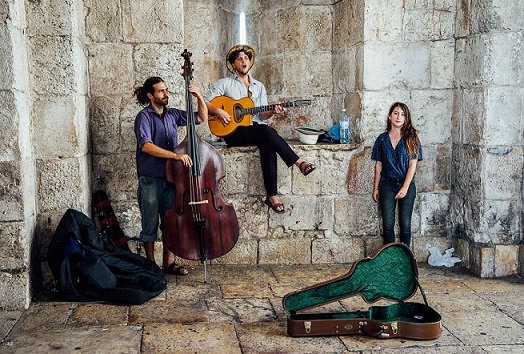
To help you create the best possible answers, I’ve included four things here:
- IELTS-style questions on the topic of music
- Sample answers
- A list of common music vocabulary with definitions & sample sentences
- Links to online reading and listening resources
You’ll find
PDF downloads of both the questions and sample answers and the vocabulary list
at the bottom of the respective sections.
The
questions relate to the Speaking test because this part of the exam offers the
broadest range of possible questions on this topic. They give the best
opportunity for me to demonstrate the vocabulary and for you to practise using
it.
I’ve
included IELTS-style questions and answers for all three parts of the Speaking
test. I’ve highlighted keywords and phrases in bold.
You’ll find
these words and phrases, and many others, in the vocabulary list beneath. There’s
also an audio to listen to the pronunciation.
Finally, at
the bottom of the page, I’ve added links to topical articles, short videos and
podcasts that will help you to improve both your music vocabulary and your
reading and listening skills.
IELTS-Style
Speaking Test Questions and Answers
Common music vocabulary
is highlighted in bold.
Part 1
1) What types of music do you like to listen to?
It depends on what mood I’m in but
generally, I like easy listening
although I am a massive fan
of country music and play
this genre more than any
other.
2) Are there any kinds of music that
you dislike?
I’m not really into jazz. It’s just not my taste in music, especially when
the musicians improvise. It sounds like they are
all playing different tunes
and there’s no harmony.
3) Do you ever go
to music gigs?
I love listening to live music and go to local gigs at least once a month. I only go
to concerts by top bands once in a blue moon as I live a long way from the big music venues.
4) Have you ever been in a music group or a band?
I
was a vocalist in my church
music group for several years
and also sang in the choir
when I was in school.
5) Does your country have a
traditional type of music or dance?
Folk music and Morris dancing are both traditional
in the UK. The music for this type of dancing is often played on the fiddle and accordion, with a drum
to give the dancers a good rhythm
and beat.
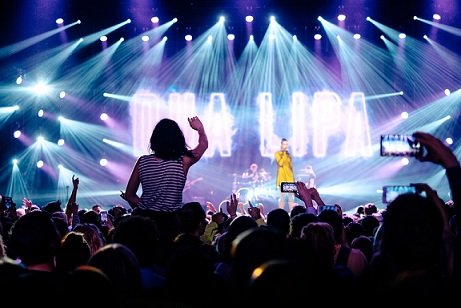
Part 2
Describe your favourite music
group or band.
You should say:
- what group or band is it
- what type of music they play
- how long you have been listening to their songs
and explain why you like this music
group or band.
I
like many different groups but
the one that comes top of my list has to be Bruce Springsteen and the E Street
Band.
I
first heard their music way back in 1980. I had a boyfriend who had one of their
albums and I was a fan from the first track I heard. I’ve been
listening to them ever since. The song
that really hooked me was “The River”. It’s still one of my favourite songs of all time. It has a slow,
haunting melody and beautiful
lyrics.
In
those days, very few people in my country had heard of Bruce Springsteen but
all these years later his band
are often on tour here and they
play sellout concerts around the world. His
nickname is “The Boss” which shows how much people respect him and his great
music.
Although
the E Street Band are essentially a rock
band, there are strong influences of folk, rock and roll, blues
and country in their music
which helps then appeal to a wide audience.
I
was once given two tickets to one of the band’s
concerts at Cardiff Arms Park
rugby stadium; a great venue. They were a Christmas present and I took my sister along with
me. It’s the only time I’ve seen them at a live
gig but it’s an event I shall never forget. What a wonderful experience.
We sang along to all the songs.
The
highlight of the show was when they performed “The River. At the end, the band stopped playing and Bruce
led the audience in singing the
chorus over and over again.
It was amazing and a very special moment. I actually found it quite moving as
that was the song that had
started me as a fan all those
years ago and there I was singing it with him. There was silence when it
finally ended and then the applause
started and went on for what seemed like forever.
It’s
hard to put in words why I like Bruce Springsteen and his band so much. I think it’s because their lyrics are so real while most of
the songs have a strong melody that stirs your soul. That’s
the best way I can put it.
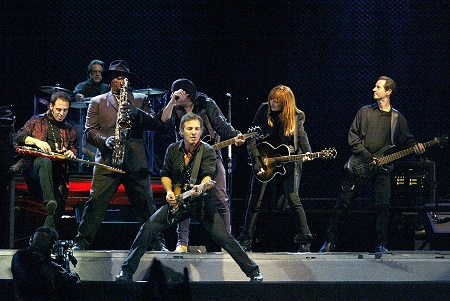
Part 3
1) Is it important to listen to
music with other people?
I think that listening to
music can be both a social experience and a personal one. Young people in
particular like chilling out
with friends while listening to their favourite tracks. There’s also something special about attending a live gig with your mates and singing along to the familiar tunes with all the other fans.
I’ve only ever been to a
couple of music festivals but
what I remember as much as the bands and
the fantastic music was the atmosphere of the events and that was created by all
the people who were there.
On the other hand, you can
enjoy music just as much when listening on your own. The fact that everywhere
you look there are people walking around wearing earphones or headphone
seems to be proof of this. So, in conclusion, I would say that while it’s nice
to share music with others, it’s not especially important.
2) Why
do you think older and younger generations prefer different types of music?
That’s
something I’ve never really thought about but I suppose it’s because they grew
up listening to different types of music as styles change over time.
Speaking
for myself, there are many talented new bands
and singers that I enjoy listening to. I often buy their albums and download
them onto my MP3 player, but
there’s nothing quite like the music I loved when I was in my teens. Perhaps it’s
as much to do with the memories it brings back as the music itself.
That’s
how I see it and I guess that many other people probably feel the same.
3) Do you think that music should
be a compulsory subject in schools?
I
do believe that music should be taught in schools. This is for several reasons.
Firstly,
it’s important to develop children’s creativity and music is a great way to do
this. They should be encouraged to learn to play a musical instrument, but it’s valuable if they just enjoy learning
and singing a few songs
together.
Secondly,
making music is an excellent way of teaching youngster how to work together in
a fun way and most of them enjoy performing to their friends.
Finally,
most schools put on concerts
and other musical performances. Taking part in these gives children confidence and
they are an important part of the curriculum.
While
older children may drop the subject for exams, having school choirs and orchestras provides
other opportunities for them to continue their interest in music.
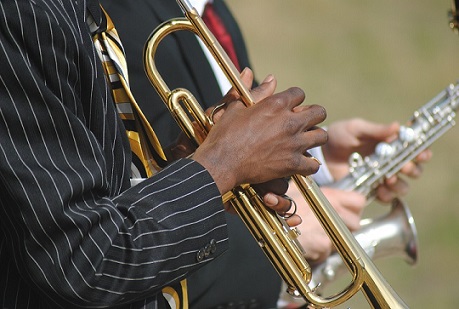
Click this link to get a PDF download of these practise questions & sample answers.
Download PDF Now
Music Vocabulary
* Important
- Do not try
and learn this list of music vocabulary.
- Identify
the vocabulary you find useful for answering practise questions about this topic.
- Record
these in your vocabulary notebook and practise using them regularly.
I recommend that you create
your own answers to the Speaking questions on this page. You will find many
other IELTS-style practise questions by searching online.
For help on how to learn
vocabulary, what to learn and how to record it, visit these pages:
How to Learn Vocabulary for
IELTS
Top 6 Types of IELTS
Vocabulary & Topic Word Lists
Music Vocabulary – Common Words & Phrases
Music Vocabulary Set 1: Key definitions
Set 1: Music genres
There are
many different styles of music around the world. These are some of the
mainstream genres but do add others to your own music vocabulary list if there
are particular styles you like that aren’t included here.
music genre – a distinct type or style of music
— My favourite music genre is rap.
pop – popular music; music liked by a
broad range of the population
— Pop songs are enjoyed by lots of different types of people
because they have a good rhythm, a catchy melody, and are easy to remember and
sing along to.
rock music
– music that is based on amplified instruments, especially the electric guitar
and electric bass, and characterized by a strong bass line and strong rhythms
— The Rolling Stones play some of the
best rock music ever written.
heavy metal – a type of highly amplified
harsh-sounding rock music with a strong beat, characteristically using violent
or fantasy imagery
— I like some rock music but find heavy metal a bit too loud.
rap – a
type of music in which the words are not sung
but are spoken in a rapid, rhythmic way
— Whilst I’m not a great fan of rap music, I do think it’s amazing how they speak so fast and
remember the words.
country music – a
form of popular music originating in the rural southern US. It is a mixture of
ballads and dance tunes played characteristically on fiddle, banjo, guitar, and
pedal steel guitar.
—
There’s a great country music venue
in my town where everyone dresses up as cowboys when they go to gigs.
jazz – a style of music that is generally
loud and rhythmic, where the musicians often make the music up as they go along
—
Louis Armstrong is still a popular jazz
musician many decades after his death.
reggae – a form
of music with a distinct beat that originated in Jamaica and is still
associated with the Caribbean
— Bob Marley was the first internationally known reggae musician.
blues – African-American
music that expresses grief or sorrow about injustice and a longing for a better
life
— Did you know that the blues
is named after the expression ‘to feel blue’ which means to be sad or
depressed?
Music Vocabulary Pronunciation
traditional music – songs and tunes particular to a country or region which have been performed over a long period of time, usually several generations
— Traditional music is part of our culture and should be preserved.
folk – traditional music which included
songs written a long time ago and new songs written in the old style
—
We have some talented young folk
musicians in my country who love performing songs from the old days and writing
new folk songs for our generation.
classical music – a form of music developed in Europe mainly in the 18th and 19th centuries by musicians highly skilled in musical composition
— I find that classical music
really stirs up the emotions and I particularly enjoy listening to Beethoven and Bach.
opera – a
musical play, often very dramatic, in which most of the words are sung
— I’m not a fan of opera
as I really don’t like the style of singing.
musical – a play or film that
uses singing and dancing in
the story but also includes a lot of spoken dialogue
— Although there are lots of great new musicals being written, I still love West Side Story the best.
instrumental music – music where you
just hear instruments playing and there is no singing
— I’m not happy when they play instrumental music on my favourite
radio station as I like to be able to sing along the lyrics.
easy listening
– a type
of music that is not complicated, is pleasant to listen and doesn’t need much
of your attention
— When I
get home in the evening I put on some easy
listening to help me relax after a busy day.
background music – music that is playing while something else is happening
— My friend likes to have background music on while she’s
studying but I need a quiet place to work.
Music Vocabulary Pronunciation
Music Vocabulary Set 2: Musical instruments & playing music
If there are any traditional musical
instruments popular in your country that you might want to talk about, add them
to your own music vocabulary list.
instrument – something you play to make music
Some common instruments:
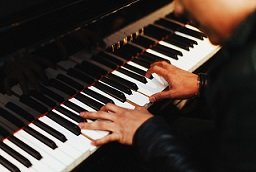
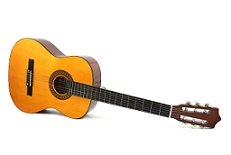
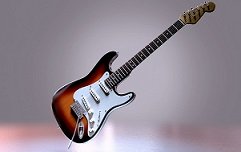
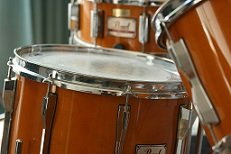
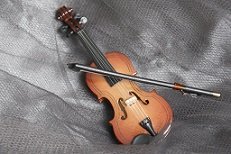
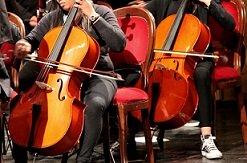
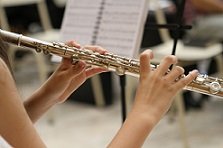
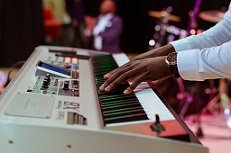
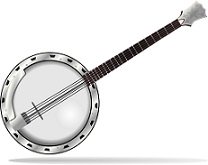
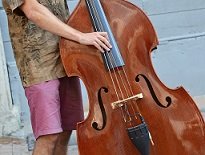
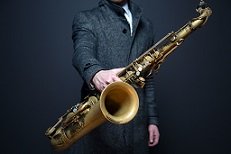
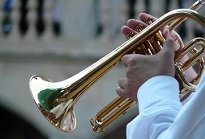
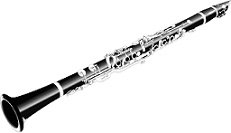
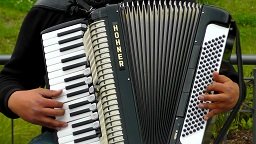
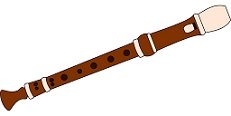
Music Vocabulary Pronunciation
traditional
instruments – a type of instrument that
has been played for many generations or that was popular in the past,
often unique to a country or region
— A sitar is a
traditional Indian musical instrument.
to take up (a musical
instrument) – to
begin learning a musical instrument
— I’m going to take up the guitar.
to read music – to understand and follow written
musical notes
— I’m so glad I learnt to read music when I had piano lessons as
a child because it really helps me now that I sing in a choir.
to play by ear – to play without reading the
musical notes
— Many talented musicians can’t even
read music and only play by ear.
talented
– to be naturally skilled at something
—
I never got the hang of playing an instrument even though both my
parents are talented musicians.
to
be musical – have a
skill in or a great liking for music
— My friend Sally is very musical and can play several different
instruments.
self-discipline – the ability to make yourself do things you know you
should do even when you do not want to
— You need
a lot of self-discipline to learn
the piano as you have to practise every day and play boring scales.
sense
of accomplishment – to feel
like you’ve achieved something you can be proud of
— Bernie
felt a real sense of accomplishment
at passing his Grade 2 flute exam.
vocals – a part of a piece of music that is sung
— My parents met in a band. Dad was a guitarist and Mum sang vocals.
Music Vocabulary Pronunciation
Music Vocabulary Set 3: Musicians
musician – a person who plays a musical instrument, especially as a
profession, or is musically talented
— It was Jai’s ambition to be a professional musician and play in a famous
orchestra.
bass player
– someone who plays the bass
conductor
– the person who leads the orchestra
guitarist
– someone who plays the guitar
keyboard player
– someone who plays the keyboard
pianist
– someone who plays the piano
drummer
– someone who plays the drums
cellist
– someone who plays the cello
violinist
– someone who plays the violin
vocalist
– someone who sings
— Phil Collins was unusual in being both the drummer and lead vocalist in a band, the famous Genesis.
choir
– a group of singers singing together
— Lulu really enjoyed singing in the choir, especially when they performed at concerts.
orchestra – a large group of musicians who play many
different instruments together and are led by a conductor
— Jason was delighted when he was asked to play violin in
the school orchestra.
band – a group of people who
sing together and also play instruments
— I was so excited to be asked to play
bass guitar in the new band.
group – a collection of people
who sing together but do not necessarily play instruments
— All the groups performing
in the contest were excellent and it was hard for the judges to pick the best.
composer
– a
person who writes music, especially as a professional occupation
— My favourite classical composer is Mozart.
Music Vocabulary Pronunciation
Music Vocabulary Set 4: Live music
a performance
– the act of entertaining other people by dancing, singing, acting or
playing music
—
The choir gave a wonderful performance at my sister’s wedding.
a gig
– a performance of a band
— My new band is playing their first gig at the weekend.
a show
– a performance,
especially involving music
— I’m
going to my kid’s school this evening to watch them perform in a show.
live
music – music
performed in front of an audience
— We have many clubs in my city and
I often go along with friends to listen to live
music.
Collocations:
- live show
- live
performance - live gig
music festival – an organized event, typically lasting several days, featuring
performances by various musicians, singers and groups
— I try to go to at least one music festival each summer.
concert – a performance of music by one or more
musicians or singers
— My orchestra is going to perform at a concert organized to raise money for charity.
stage
– a raised platform on which musicians, actors or entertainers
perform
— I felt nervous when I walked out on stage and saw the large audience waiting to hear me sing.
venue – the place
where a public event such as a concert happens
— The disused warehouse was
the perfect venue for a rock
concert.
Music Vocabulary Pronunciation
Music Vocabulary Set 5: Recorded music
recording / recorded music – music that has been
stored on a record, CD, computer, etc., so that it can be heard again
— I
have recordings of many of my
favourite bands stored on my computer.
MP3
player – an electronic device that can store and play digital audio files
— I always carry my MP3 player with me so that I can listen
to music whenever I want to.
headphones
/ earphones – an electronic device that fits over or in the ears for
listening to music
— I wear earphones
to listen to music on my MP3 player while I’m out jogging.
album – a collection of recordings issued as a single item on
CD, record or another medium.
— I can’t
wait for my favourite band’s new album
to come out.
to download tracks – to obtain music from the internet
— I heard a great band at the gig
last night and I’m going to download
some of their tracks.
speakers
– a piece of electrical equipment for playing recorded sound, through which the sound is played
— The jazz album I got for my
birthday sounds amazing
through my new speakers.
Music Vocabulary Pronunciation
Music Vocabulary Set 6: Describing music &
songs
a song
– a
usually short piece of music with words that are sung
— My favourite Ed
Sheeran song is “Thinking Out Loud”.
lyrics – the
words to a song
— Leonard Cohen wrote some
of the best lyrics of all time and
many artists still perform his songs today.
a melody – the main tune in a piece of music that is often played or sung more than once
— I had
trouble picking up the melody of the
new piece we started learning at choir rehearsal today and will practise it at home.
a tune
– the musical part of a song, especially one that
is pleasant and easy to remember
a catchy tune – a tune or a song that’s easy to
remember and stays in your mind so that you find yourself humming or singing it
— I heard a really catchy
tune of on my kid’s TV programme this morning and I’ve been humming it all
day.
piece of music – a musical composition, especially but not necessarily an
instrumental one
— My piano teacher has given me a
new piece of music to learn before
my next lesson.
taste in music – the music someone likes
— My boyfriend and I have the same taste in music and go to live gigs
whenever we can.
rhythm
– a regular, repeated pattern of sounds
— I love the rhythm of
reggae music.
beat
– a characteristic
rhythm in some types of music
— Rap music has such a distinctive beat.
harmony – a pleasant musical sound made by different notes being
played or sung at the same time
— One of
the reason I enjoy country music so much is because many songs have lovely harmonies.
Music Vocabulary Pronunciation
to be out of tune – to play or sing slightly wrong notes
— My dad likes to sing along the radio but is so out of tune that it sounds terrible.
to be in tune – to play or sing with the correct pitch
— Before the performance, the guitarist tightenend the strings of his guitar so that it was in tune.
to have a great voice – to sing well
— I think my friend should enter the singing competition as she has a great voice.
to be tone deaf – to be unable to distinguish the different notes in music
— I’d really like to able to sing but I’m tone deaf so I don’t think there’s much chance.
chorus – a regularly repeated line or group of lines in a song
— The choir sang lots of well-known songs and encourages the audience to sing along to the choruses.
upbeat – cheerful or lively
— If I’m feeling sad I put on some upbeat music and feel better almost at once.
nursery rhyme – a simple traditional song or poem for children
— I can still remember many of the nursery rhymes I learnt as a child.
lullaby – a quiet, gentle song sung to send a child to sleep
— If my baby wakes up in the night I just sing him a lullaby and he soon goes back to sleep.
sing to sleep – to make someone feel sleepy by sing them a gentle song
— My mum used to sing us to sleep when we were young.
Music Vocabulary Pronunciation
Music Vocabulary Set 7: Music & the emotions
passionate –
to feel strongly about something
— I’m passionate about playing the saxophone.
to cheer
up – to cause to feel better
— Upbeat music always cheers me up if I’m feeling down.
relax / chill
out – to become less tense or
anxious
— After a stressful day at
work, I lie in the bath listening to classical music as this helps me to chill out.
energise
– to
make someone feel energetic or eager
— Reggae music energises me so that’s what I Iisten to
when I feel sluggish and need motivating.
Music Vocabulary Pronunciation
Music Vocabulary Set 8: Other music vocabulary
rock band – a group of musicians that play rock
music
— One of the great things about
living in Manchester is that all the top rock
bands perform here.
pop star – a famous singer or musician who performs
pop music
— Many teenagers have the dream of
being a pop star as they want to be rich and famous.
famous – known about and recognized by
many people
— The Beatles are one of the most famous bands ever to have existed.
frontman –
lead singer of a band
— Roger Daltrey has been the frontman of The Who for over 50 years.
fan – a person who admires, supports or follows a person, band or team
— I’ve always been an Elvis Presley fan even though he died before I was born.
huge
following – to have a large number of fans
— Modern pop stars have a huge following
which they communicate with on social media.
to go on tour – to go on a planned series of performances around a region
or country
— I hope my favourite band go on tour again soon as they put on an
amazing live show.
sellout – a performance or sports event for which
no more tickets are available because it’s so popular
— The Bruno Mars concerts were a sellout at every venue on the tour.
record company
– a business that makes and sells musical recordings
— Our band
is getting well-known across the country and we’re hopeful of getting signed by
a record company.
record label
– a brand or trademark associated with the marketing of music recordings and
music videos
— You know you’ve hit the big time if you get signed up with
one of the big record labels such as
Sony.
hit the big time
– to become successful and/or famous
— After winning the TV talent show, Shelley hit the big time and was soon singing
in huge venues around the world.
a hit – to be popular; a record that sells lots of copies
— “Happy” was a massive hit for Pharrell Williams.
Music Vocabulary Pronunciation
the charts – a list of individual songs or musical performances ranked in order of number of sales or downloads over a specific period of time which indicates their popularity
— Ariana Grande’s new record is brilliant and I’m not surprised it’s made it to No.1 in the charts.
to sing along to – to join in singing
— My favourite songs in the charts are always the ones you can sing along to.
a sing-song – to sing informally, often with other people
— I have wonderful memories of my gran playing popular songs on the piano at family get-togethers and everyone joining in for a sing-song.
music-lover – someone who really enjoys listening to music
— I can’t say I’m a great music-lover although I do enjoy listening to the radio when I’m driving.
applause – approval or praise expressed by clapping the hands together
— The applause continued even after the band had left the stage.
- a round of applause – an outburst of clapping from an audience to show approval
— The audience gave the choir an enthusiastic round of applause as they came on to perform.
to be into / not into – to be interested in or involved with / to not be interested in
— I’m really into folk music but not into jazz at all.
to improvise – create and perform music, drama or verse spontaneously or without preparation
— I don’t enjoy listening to jazz when it’s improvised as it sounds like the musicians are all playing different tunes.
once in a blue moon – hardly ever
— I’m definitely a music-lover but only go to live gigs once in a blue moon.
Music Vocabulary Pronunciation
Click this link to get a PDF download of this list of music vocabulary.
Download PDF Now
Ways to Improve Your Music Vocabulary
One of the best
ways to improve your music vocabulary is through reading. Watching topic related YouTube
videos and listening to podcasts is also hugely beneficial.
Here are some
online resources I recommend.
Music Articles
These online publications contain music news and related articles. Most music genres have their own publications so search for those that particularly interest you, e.g. «Jazz magazines» or «Jazz articles».
Pitchfork
BBC News — Music
The Guardian — Music
TED Talks
I love TED Talks. They are short videos
with a powerful message and are generally very interesting. They’re ideal for
improving your vocabulary and give valuable listening skills practise.
Search TED Talks — Music to help you improve your music vocabulary. It will take a bit more searching to find something relevant than with some other topics but it’s worth seeing what you can find.
All Topic Vocabulary
Like this page?
-
Home
-
IELTS Vocabulary
-
Music Vocabulary
›
›
-
Back To Top
Below is a list of words related to another word. You can click words for definitions. Sorry if there’s a few unusual suggestions! The algorithm isn’t perfect, but it does a pretty good job for common-ish words. Here’s the list of words that are related to another word:
Popular Searches
Words Related to ~term~
As you’ve probably noticed, words related to «term» are listed above. Hopefully the generated list of term related words above suit your needs.
P.S. There are some problems that I’m aware of, but can’t currently fix (because they are out of the scope of this project). The main one is that individual words can have many different senses (meanings), so when you search for a word like mean, the engine doesn’t know which definition you’re referring to («bullies are mean» vs. «what do you mean?», etc.), so consider that your search query for words like term may be a bit ambiguous to the engine in that sense, and the related terms that are returned may reflect this. You might also be wondering: What type of word is ~term~?
Also check out ~term~ words on relatedwords.io for another source of associations.
Related Words
Related Words runs on several different algorithms which compete to get their results higher in the list. One such algorithm uses word embedding to convert words into many dimensional vectors which represent their meanings. The vectors of the words in your query are compared to a huge database of of pre-computed vectors to find similar words. Another algorithm crawls through Concept Net to find words which have some meaningful relationship with your query. These algorithms, and several more, are what allows Related Words to give you… related words — rather than just direct synonyms.
As well as finding words related to other words, you can enter phrases and it should give you related words and phrases, so long as the phrase/sentence you entered isn’t too long. You will probably get some weird results every now and then — that’s just the nature of the engine in its current state.
Special thanks to the contributors of the open-source code that was used to bring you this list of term themed words: @Planeshifter, @HubSpot, Concept Net, WordNet, and @mongodb.
There is still lots of work to be done to get this to give consistently good results, but I think it’s at the stage where it could be useful to people, which is why I released it.
Please note that Related Words uses third party scripts (such as Google Analytics and advertisements) which use cookies. To learn more, see the privacy policy.
Recent Queries
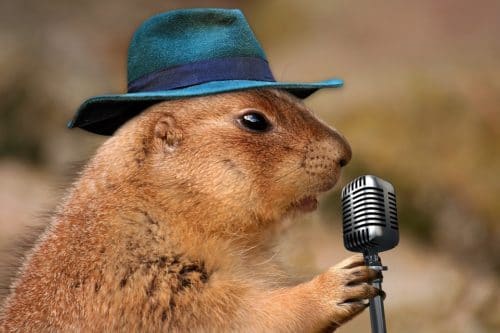
By
Last updated:
December 14, 2022
How to Talk About Rock, Pop, Indie and Country Music in English
If you feel that a lack of knowledge in English is stopping you from having deep conversations about music, then do not worry. We have you covered.
We have already talked about the most common idioms you will find in songs. We also have helpful posts about how you can learn English with music.
In this blog post, we will teach you terms you will need to know to have a basic English conversation about music.
Contents
- Most Common Genres of Music
-
- 1. Classical
- 2. Jazz
- 3. Hip-Hop/Rap
- 4. Electronic
- 5. Rock
- 6. Disco
- 7. Fusion
- 8. Pop Music
- 9. Country
- 10. Blues
- 11. Reggae
- 12. Indie
- English Terms You Can Use to Describe Music
-
- 1. Beat
- 2. Tempo
- 3. Upbeat
- 4. Note
- 5. Chord
- 6. Harmony
- 7. Tune
- 8. Rhythm
- 9. Groove
- 10. Lyrics
- 11. Chorus
- 12. Track
- 13. Album
- 14. Band
- 15. Orchestra
- 16. A cappella
- 17. Ambient
- 18. Classic
- 19. Anthem
- 20. DJ
- 21. Jamming
- 22. Rocking
- 14 English Questions and Phrases About Music You Can Use
-
- 1. Can you turn up the music?
- 2. Dancing to the beat
- 3. That’s a catchy song!
- 4. Do you want to go to that gig/concert/show?
- 5. It makes my ears bleed!
- 6. This cover is better than the original
- 7. I love your playlist
- 8. This is our song
- 9. Dancing till we drop
- 10. I can’t get this song out of my head
- 11. This song has topped the charts
- 12. I am so excited about karaoke night!
Download:
This blog post is available as a convenient and portable PDF that you
can take anywhere.
Click here to get a copy. (Download)
Most Common Genres of Music
1. Classical
Classical music has been around for centuries. It generally means music created in Europe in the 18th and 19th century or before.
Most classical music like concerto, symphony and fugue do not have any vocals. A key characteristic of classical music is that it is written down in the form of a musical notation.
Like the script of a play, it defines the pitch, rhythm and coordination of different instruments in a piece of music. This means that there is less scope of modification of a single piece of music, unlike the other genres mentioned here.
Example: “5th Symphony” by Beethoven
2. Jazz
This category of music was created in the beginning of the 20th century. Its most striking feature is the use of brass instruments like the saxophone and improvisation (modifying the music while playing it).
Example: “Sunday” by Wild Bill Davison and Classic Jazz Collegium
3. Hip-Hop/Rap
This sort of music came out of New York City in the 1970s. Its main features include fast, rhyming lyrics (rapping) and repetitive, rhythmic music played along with the rap.
Example: “It Was a Good Day” by Ice Cube or “Mockingbird” by Eminem
4. Electronic
Electronic music uses digital tools and electronic instruments to create songs and music. It is quite popular in our age and it has a distinct artificial sound to it. This genre is sometimes called EDM or “electronic dance music.”
Example: “Just Dance” by Lady Gaga
5. Rock
Rock music started in the 1950s in the USA. Its most distinct features include the use of electric guitar and the “rock band” culture where the band as a whole is more important than individual singers (unlike in pop music).
We have an example down below, but if you want to find more songs to add to your playlist, the FluentU program has a variety of music videos with interactive captions (as well as many other types of videos). Spotify is another excellent option for finding more songs, and many have the option to see the lyrics as the song plays, as well.
Example: “Stairway to Heaven” by Led Zeppelin
6. Disco
This category also emerged in 1970s urban America and became world famous for its dance culture. Its characteristic reverb vocals and electric synthesizers are still used in many songs today.
Example: “I Feel Love” by Donna Summer
7. Fusion
Fusion music is the mixing of two or more genres together to make a new style of music. Generally it refers to the mixing of so called “Western” music and the musical characteristics of other traditions like Indian classical or Chinese music.
In the example below, it mixes Indian classical music with pop music.
Example: “Norwegian Wood” by The Beatles
8. Pop Music
The full form of “pop music” is popular music and, as the name suggests, it is that category of music that produces the most sales. The common elements of all pop music is that it is simple both lyrically and musically, easy to sing and has some repetitive catchy elements.
Example: “Shape of You” by Ed Sheeran
9. Country
Unlike all the other genres until now, this one emerged in the rural parts of the US. A normal guitar is its most recognizable sound along with a special focus on lyrics and vocal singing.
The focus in these songs is to convey a message clearly and tell a story. Its most distinctive features are the twang and the yodel, which are basically ways of singing influenced by accents you will find in the southern regions of the US.
Example: “Friends in Low Places” by Garth Brooks
10. Blues
“Feeling blue” means to feel sad and low, and this musical genre tries to convert that feeling into song.
It arose in late 19th century America in the African-American community and is best known for its repetitive lines and its brass instruments. It had a huge impact on jazz and country genres.
Example: “The Thrill is Gone” by B.B. King
11. Reggae
Meaning: This genre was created in Jamaica by combining blues and calypso (a Jamaican form of music). It is known for its offbeat sound and its lyrics talk about social issues.
Example: “One Love” by Bob Marley
12. Indie
Meaning: Just like pop music, this does not really mean one style of music. Indie music is music not produced by the big companies that normally produce most popular and profitable songs. This allows indie bands to experiment a lot and create their own unique style of music.
Example: “I Love You Baby, I Love You Doll” by Parekh and Singh
English Terms You Can Use to Describe Music
1. Beat
The beat of a song is the regularly repeating sound in it. This beat often defines the speed and the rhythm in which the song is played. If you ever find yourself tapping your finger or your foot while listening to music, you are most probably following its beat.
A song with a faster beat is often seen as more energetic, happy or even angry. A slower beat gives the feeling of being calm, sad or peaceful.
Example: The beat of this song makes me feel so low.
2. Tempo
Tempo is the speed in which a particular piece of music should be played. It defines the beat and is usually measured in “beats per minute” or BPM. As mentioned above, higher BPM usually gives the feeling of more energy and most pop songs have high BPM.
Example: I like to listen to slow-tempo songs when I need to relax.
3. Upbeat
A song or piece of music is called “upbeat” when it sounds happy and cheerful. Mostly, upbeat music also has happy lyrics and is designed to create such feelings in their audience.
Example: Listening to upbeat music in the morning helps me feel good throughout the day.
4. Note
A musical note is a small bit of sound which has a certain pitch. A note is the building block of any song, with or without words. You can think of them like syllables for music.
Example: She is a great singer because she always sings the right notes.
5. Chord
A chord is a collection of three notes in a song. It might help to watch this video to know what it sounds like.
A chord can also mean feeling or emotion in general English.
Sometimes these two meanings are combined in the phrase “to strike a chord.” It is used when someone is able to make their audience feel sympathy or a particular emotion about a subject.
Examples:
The chord progression in that song is totally out of this world. (The “chord” in this sentence is strictly musical.)
That song about love really struck a chord with me. (This is related to the phrase mentioned above.)
6. Harmony
Meaning: Harmony in music is when two or more notes are heard together. In a more general sense, it is about whether a set of notes sound good together or not.
In many classical traditions, there are strict rules regarding chords used to create musical harmony.
Example: That singer’s sense of harmony is simply amazing.
7. Tune
In music, a tune is a series of musical notes which sounds pleasing or harmonious. “To tune” can also mean fixing the pitch of a musical instrument so that it sounds right. In informal English a “tune” is simply a piece of a song or music.
Examples:
I simply cannot get that tune out of my head.
That musician took twenty minutes to tune his instruments in the concert.
8. Rhythm
Meaning: Rhythm is a pattern of musical sounds. Usually it is created by using repetition and predictable change in the notes of the song and the beat.
Example: The rhythm of disco music is perfect for dancing in parties.
9. Groove
In casual English, when we use the word groove in music we usually talk about the rhythm of a jazz or pop song. Groove can also mean other things.
It might refer to habits in our everyday lives. Or it can be used for a long, narrow cut in solid materials like rocks or wood. It is important to pay attention to the context so that you know the exact meaning of this word in a sentence.
Example: This new pop song uses old jazz grooves.
10. Lyrics
Lyrics are the words of a song. Usually each paragraph of lyrics is said to be a “verse” and is accompanied by specific chords and rhythms.
Example: I like to focus on the lyrics of a song since I care about what the song is trying to say.
11. Chorus
This is the part of a song that is repeated over and over again. A chorus can also mean a large group of singers who perform with other instruments. This video is a good example.
Examples:
The chorus of this song is unforgettable.
The chorus of that school is famous for making covers of pop songs.
12. Track
A “track” is one of the several songs in a device. In the days when CDs, cassettes and DVDs were still being used to listen to music, a track referred to a specific song in that device. But now since digital files usually do not have any tracks, people use it as another word for any song.
Example: There is a great Madonna track in that CD.
13. Album
An album is a collection of songs usually sold as a DVD or as digital files. Generally, one album is made by one singer and has a theme that connects all songs. Sometimes one album can have many artists and then it is called as a “collaboration.”
Example: Michael Jackson’s first album was my favorite one.
14. Band
A small group of musicians who play songs in a certain genre of music. Typically, one band has one or two main vocalists who use their voice to sing and the other members play one type of instrument such as guitars, drums or piano. One band should have at least two members.
Example: All the new rock bands sound the same.
15. Orchestra
An orchestra is a group of musicians who only play instruments. Generally each orchestra has groups of musicians who play different types of instruments (like string instruments such as a guitar, violin, etc.).
The musicians in the orchestra are generally guided by a “conductor” who remembers the whole musical piece and makes sure that everyone is playing correctly. You will typically find orchestras play classical music.
Example: I love how orchestras can make you feel something by just using their instruments.
16. A cappella
This is a word with Italian roots. To sing “a cappella” is to sing without any instruments. The word literally means “in chapel style” since in old churches they sang without any instruments.
Example: The chorus sounds best a cappella.
17. Ambient
A piece of music is called “ambient” when it creates a certain mood in people without distracting them. Usually ambient music has no or little lyrics and is usually slow and less noisy.
Example: I always need some ambient music to help me study for exams.
18. Classic
A classic is usually an old song that is still regarded as good music of the highest quality. Generally a “classic” is a piece of art which has survived the test of time. The word “classic” can also mean “typical” in certain contexts.
Examples:
Classic jazz reminds me of the good old days of music.
This is classic Beatles.
19. Anthem
This is a type of song that typically makes you feel proud or praises something. For instance, all national anthems praise their own nation. It symbolizes certain values that every member of a group identifies with.
Example: This song is an anthem of our times.
20. DJ
The full form of a DJ is “disc jockey.” A jockey is a person who handles something in a skillful way. And “disc” refers to circular vinyl records that were used to record music in the past.
The work of a DJ is to select, mix and play music ideal for dancing. A DJ can either work in a club or in radio stations.
Examples:
Joe is the best DJ in the city.
Having a good DJ is necessary for a good party.
21. Jamming
When a few musicians informally meet together and play music, it is called “jamming.” Usually the musicians experiment and improvise (modify) the songs they play to come up with something new.
The word became popular when jazz music became famous in early 20th century.
Example: I used to jam with the best musicians back when I was young.
22. Rocking
The verb “rock” means to move gently from side to side or to shake. Rock music used this verb to define itself and it is characterized by its heavy beats and rhythms. Now rocking can means that someone is doing something extremely well, especially in music.
Example: That musician is rocking that guitar.
14 English Questions and Phrases About Music You Can Use
1. Can you turn up the music?
To “turn up the music” means to increase the volume of the song that is currently being played. This phrase is a part of informal English and is mostly used in parties or other casual events.
Examples:
Can you turn up the music? This song is my favorite one.
The cars outside are so loud that I cannot hear the song. Can you turn up the music?
2. Dancing to the beat
The act of dancing according to the rhythm of the song is called “dancing to the beat.” It is usually used when a person matches the beats of the tune almost perfectly.
Example: Joe always impresses everyone when he starts dancing to the beat of a hip hop song.
3. That’s a catchy song!
When something is described as “catchy,” it means that it is very attractive. Generally a catchy song is a piece of music that instantly catches your attention and you cannot get it out of your mind once you hear it.
Example: I hate its lyrics but even I have to accept that it’s a catchy song.
4. Do you want to go to that gig/concert/show?
A “gig” is a musical event, usually featuring songs by a local musician. So asking whether someone wants to go to a gig is either inviting them or confirming that they are coming for the musical show. A concert can mean the same thing, but it can also apply to a big artist or band.
Examples:
I cannot go for that gig today since I am not feeling very well.
Do you want to go to that show? I heard they will play songs they never played before.
5. It makes my ears bleed!
When someone dislikes a particular song too much, they say that it “makes their ears bleed.” It is a way of expressing that you hate the song so much that you feel your ears are being damaged.
Example: Please do not play rock music, it makes my ears bleed!
6. This cover is better than the original
When someone records a song made by another person in their own voice it is called a “cover.” Usually instead of copying the original artists, many singers change the song according to their own style. To say that a cover is better than the original is to say that you like this modified version better.
Example: I love the Beatles, but this cover is even better than the original song.
7. I love your playlist
When someone groups certain songs from various places according to a theme or purpose, that is called a playlist. Generally people share these lists with each other digitally. This phrase is used when you really like the selection of songs they have grouped in a playlist.
Example: I love the playlist you use for jogging. Can you please share it with me?
8. This is our song
Sometimes friends or lovers feel that both of them connect to a certain song. When a song in any way symbolizes their relationship, they say that the song is their song.
Example: I feel that this is our song because it summarizes all the memories we have with each other.
9. Dancing till we drop
When someone says they are going to dance till (until) they drop, they decide to dance with all the energy they have. Usually this phrase is used in parties and night clubs where everyone is supposed to enjoy the music.
Example: Last night we danced till we dropped and now I cannot even get out of bed.
10. I can’t get this song out of my head
When you keep repeating a song either silently or otherwise, you use this phrase to describe that experience. It is also used when you want to forget a particular song but simply cannot.
Example: I hate this singer but I can’t get this song out of my head.
11. This song has topped the charts
“Topping the chart” is used to describe a song when it has sold really well and is extremely popular. In the English music industry, there are regular charts that show how many times a song has been bought or played. The songs which are given the first rank in these charts are said to be “chart toppers.”
Example: Even though this musician’s last album didn’t do so well, her latest song has topped the charts.
12. I am so excited about karaoke night!
“Karaoke” is a Japanese word used to describe a favorite music-related pastime. It is like a game played in clubs and bars where a person is supposed to sing in a microphone and the background track is played along with lyrics on a screen. A karaoke night is typically when a group of friends go out together and sing karaoke.
Example: I never thought karaoke could be so much fun. I am so excited about the next Karaoke night!
So go on, get out and rock your English conversation skills with your fellow music lovers.
Download:
This blog post is available as a convenient and portable PDF that you
can take anywhere.
Click here to get a copy. (Download)
We all love music.
We all have our favourite songs that we love to listen to. Singers and bands that we really care about and return to their music again and again.
But how to talk about all of this music? How to express in English your admiration for your all-time favourite singers or bands?
For English students, this can be a real challenge.
So I have prepared this simple guide to help you talk about music. In the next few pages I will show you:
- Basic vocabulary for music
- Some common words and phrases when talking about music
Then I will cover
- How to talk about the sound of music
- How to express how it makes you feel
Finally, I introduce
- How we listen to music from the past to the present
Then at the end, there is a big list of questions to help you practise talking about music with your friends or by yourself.
Are you ready? Let’s dive in.
Basic Vocabulary for Music
It’s probably a good idea to look at some basic vocabulary for music first.
We need to have a good understanding of the most basic words and phrases before moving on to more challenging vocabulary.
Note
Music is made up of a series of notes. A musical note is a sound that has a defined pitch.
Any song you hear needs musical notes. Without notes, there is no music at all.
Musical notes come in different pitches or sounds. The basic scale of music is made of seven notes — A, B, C, D, E, F and G. The basic C scale is C up to B — C, D, E, F, G, A and B.
I love the singer from Gravity 8. She can really reach all those high notes.
The guitarist in RoadRage is fantastic — he plays so fast all the notes sound like one.
Chord
A chord is made of a group of notes played together in a song.
Most chords are made up of three notes together, but there can be chords with two or four notes.
Chords have a sound that is very pleasing to the ear. All the notes played together — for example, on a piano or guitar — have a very pleasant sound that makes us think these notes belong together.
I love the piano chords at the beginning of the song Temptation — they sound so beautiful.
Harmony
Harmony is the arrangement of the notes and chords played together that has a very pleasing sound to the human ear.
We can also describe harmony as the sound of two or more voices singing together. The singers may all be singing different notes, but they all sound good together.
Have you heard the new song by Generation Z? In the chorus, they all sing together in great harmony.
Tune
This is a series of notes played together in a sequence that sounds good to our ears. We might also use the word melody, but tune is more common. All songs have a tune that we can sing along to and recognise.
In English, we might also describe a song as a tune.
I love this tune!
I can’t get that tune out of my head…
The radio has been playing this song all day.
I like the new tune by The Beats. It’s really great!
Rhythm
These are the common regular pulses or beats that we hear in the music. Rhythm is the sound that makes us nod our head, tap our feet or click our fingers.
Rhythm is the sound in music that people dance to.
All popular music has a strong sense of rhythm.
I love the rhythm to this song — it makes me want to dance.
I love the strong rhythm of the song Black Rain. It sounds like thunder.
Lyrics
Lyrics are the words to a song. There are usually two parts of the song’s lyrics — the verse and the chorus.
The chorus often has lyrics that are easy to remember and make us want to sing along with the singer or the band.
Most pop song lyrics are very simple — usually love songs or songs about friendship or positive elements in life.
But some song lyrics can be very complex or poetical.
I love the lyrics to this song — so powerful.
I love the lyrics to the songs of Meredith Jacobs. They all sound like poetry.
Chorus
This is the part of the song that is repeated again and again in the song. It makes us want to sing along.
It is easy for us to remember the words, and we feel engaged with the song when we hear it.
As soon as I hear the chorus to Wonderland, I have to start singing along with it.
The chorus to the new song by Dan White is really catchy. I know all the words and I’ve only heard it five times.
Common Words and Phrases to Talk about Music
Now we have a basic understanding of common words used in music, let’s look at some vocabulary people often use when talking about music.
Turn It Up!
Essentially, this means increase the volume or make it louder.
Imagine you are in your friend’s home and a song comes on that you love.
What would you say to your friend?
That’s right: Turn it up!
You want to hear this song louder because you really like it. You want to hear more of it.
You could also say:
Turn this one up (turn this song up)
Turn the music up (make the music louder/increase the volume)
This Song is So Catchy!
When we use the word catchy to describe a song, it means that the song’s lyrics are easy to remember. But also that the tune of the song sounds great and something that we want to sing along to.
If a song is catchy, it means that the song is very popular and any time you hear it you want to turn it up.
I Can’t Get This Tune Out Of My Head
This means you love the song so much that the tune is constantly playing inside your head. Or you are humming the tune as you walk down the street or take a shower.
You love this song so you want to play it on your music system or on your smartphone at least ten times a day.
I Love This One!
This one refers to the song or tune. You hear a song playing — could be on the radio, in a shopping mall, on your friend’s smartphone — and you love it, so you use this expression.
I Can’t Stand This Song…
And this is if you really dislike the song.
You hear this song playing, but you hate it. So you can say: I can’t stand this song!
This Band is So Cheesy…
Cheesy in English is used to describe things that we dislike or that we think are low quality. It can also refer to things that are cheap, unpleasant or corny.
So if you see a band on the TV that you think fit into this category, you can say: This band is so cheesy!
We might often describe bands that sing overly sentimental love songs or boy bands as cheesy. They are not to everyone’s taste.
This Band is Really Grungy…
Equally, we might describe a band as grungy. It means they are kind of dirty and unkempt. Their clothes are not fashionable and the singer is not even good-looking — he looks kind of ugly with greasy hair!
So we say: This band is really grungy!
Oh, This Song is a Classic!
Classic is used to describe things that are very old and have great value.
So you hear a song and you love it. The song could be old — or maybe just a very popular song from last year — and so you may regard it as a classic.
And that is when you say: This song is a classic — turn it up!
I Love This Track!
Years ago people listened to songs on vinyl records and CDs.
The songs were separated into tracks. So that is why people often refer to songs as tracks. This expression just means that you love the song.
This Song Gets on My Nerves…
If something gets on your nerves, it means it makes you feel very uncomfortable or irritable.
Maybe a song comes on the radio and you hate it. You hear it and it makes you angry because it is so unpleasant.
So you say: This song gets on my nerves!
There are many words we can use to describe the unique sounds of different types of music.
Let’s look at some of them.
Sound of Music
|
gentle |
soft |
strong |
|
loud |
rich |
deep |
|
distinct |
melodious |
resonant |
|
raucous |
brassy |
piercing |
|
mellow |
smooth |
thick |
|
shrill |
warm |
natural |
|
strident |
harsh |
clear |
|
reedy |
dark |
flat |
|
bright |
thin |
light |
|
rounded |
full |
breathy |
Exercise
Look up all the words in a dictionary and find the meaning to describe music. Be careful — many of these words have more than one meaning.
After you look the words up, try to make your own sentences to describe music you like. Try to describe music you don’t like too.
Tempo of Music
We can also describe the tempo of music. This is the speed or the rhythm of the music.
|
fast |
slow |
diminishing |
|
rapid |
double time |
lively |
|
brisk |
stately |
melancholic |
|
quick |
moderate |
gradual |
|
energetic |
joyful |
even |
|
frantic |
upbeat |
steady |
Exercise
Now look up these words to describe the rhythm or tempo of music. Again, take care of the correct meaning of these words — lively, moderate and frantic, for example, will have more than one meaning.
Make sure you find the correct meaning of each word as it is related to music.
When you find the correct meanings, try to write sentences of your own to describe the rhythm of music.
People Talking About Music
Look at the following extracts of people talking about songs or music they like.
The track starts with this really fast guitar. The high notes are piercing and loud. The guitarist picks out notes so fast it sounds frantic. It just introduces the song perfectly — full of energy.
I love the saxophone in this song. It has a really rich and resonant sound to it. It adds a great level of warmth to the whole song and at the end of the solo, it sounds mournful and melancholic.
This dance track has a clear and lively rhythm. As soon as I hear it, I feel part of it. There is a kind of sadness in the first verse, but when the singer gets to the chorus, the mood changes and it becomes more joyful and upbeat.
There is a rich and natural sound to the acoustic guitar in this tune. It has a soft sound, but it also has a very deep and warm feel to it. The rhythm is very gradual but builds into a steady, marching beat that becomes quite brisk towards the end of the song.
The piano and drums play at the same tempo. A great, crushing rhythm that sounds like thunder. Then the guitar comes in at double-speed and the rhythm picks up in rapid time. But the bass plays with a thick, smooth sound that sounds completely separate from the other musicians. It gives the song a really rounded, full atmosphere.
I love the gentle strings at the beginning of the song. They sound breathy and natural, like human voices. Then the piano plays a mellow melody, at times dark and mysterious, other times warm and light like air.
The track has a very distinct sound, but the singer’s voice is flat and reedy. At times her voice sounds shrill as she reaches for the higher notes. But the bass and drums work well together, playing in a slow and steady rhythm as one.
Read through all the extracts above. Highlight all the words that describe the sound or rhythm of the music.
Now You Try
Think of FIVE of your all-time favourite songs. They can be any songs you like.
Now describe them.
Use as much of the vocabulary from the previous exercise and use the extracts above to help you.
When you have finished writing a description of each song, read it out loud to yourself.
Describing the Effects of Music
Just as we can talk about the sound of music and how it sounds to our ears, we can also talk about the effect music has on our emotions or mood.
Let’s look at some words we can use to describe this.
|
calming |
stimulating |
invigorating |
|
rejuvenating |
soothing |
exhilarating |
|
inciting |
uplifting |
empowering |
|
restoring |
healing |
enlightening |
|
exciting |
frightening |
improving |
|
focusing |
relaxing |
stirring |
Exercise
Look up each of these words in your dictionary. Make sure you find the correct meaning of the word as related to music.
Some of the words have more than one meaning, such as calming, uplifting and healing.
When you have all the correct meanings written down in your notebook, write sentences of your own to describe the feeling of music.
People Talking About the Effects of Music
Let’s take a look at some extracts of people talking about the effect music has upon them.
If I am reading or studying, I like to listen to music that has a calming effect. So I often put on some ambient music. It has a very quiet, sometimes meditative feel about it and helps me to concentrate on what I am reading.
I am a big fan of Motown soul music. Sometimes it has a kind of gospel sound to it. If I am in a low mood I like to put on some Motown music — it can be very uplifting.
In the evening, after a hard day at work, I like to unwind by listening to some jazz music. I find it very relaxing and I can get lost in my thoughts as the soft tunes go through my mind.
If I had to choose my favourite kind of music, it would be heavy metal. The louder and faster the better. I just love the screaming guitars and loud drumming. It is very exciting.
I really like to listen to classical music. I sit down and just lose track of time. I find it very emotional and stirring.
Now You Try
Think about the kind of music you like. Choose FIVE songs or pieces of music that you love to listen to again and again.
Now write some sentences about how you feel when you hear these songs.
- What emotions do you feel when you listen to this music?
- Does it make it you feel excited? Or relaxed? Or some other feeling?
Write down all your sentences in your notebook. When you have finished, practice by saying all the sentences you wrote out loud.
How We Listen to Music
Over the years, there have been many different ways for people to listen to the music they like in the comfort of their home.
Records/Vinyl
These were most popular after the second world war. In the sixties and seventies, they were at their peak. Music fans would always buy their music on vinyl records.
They died out in the eighties but are now enjoying a renaissance.
To listen to records, people would have to buy a stereo system. These could be very expensive.
Music Cassette
Music cassettes took over from vinyl. People could listen to music cassettes on smaller, more portable machines. The Sony Walkman was popular at this time too. Music cassettes were popular in the eighties but then came…
Compact Disc/CD
The compact disc grew in the late eighties and by the nineties was the standard for all music fans.
People could listen to CDs via their stereo system. Or through a portable CD player.
Digital Download
With the advent of more sophisticated technology, it wasn’t long before people were downloading music off the internet for free. This caused great concern in the music industry, so they had to adapt.
Streaming Music
Now we have streaming platforms where we can listen to whatever music we want whenever we want. And usually via our smartphone. No need for expensive stereo equipment!
This is the way most people listen to music today.
There are streaming platforms in most countries. In western countries, these include Spotify and Soundcloud.
But many people listen to music via YouTube, as there are no fees to pay.
Now You Try
- How do you listen to music?
- Do you use a music streaming service? Or YouTube?
- Or do you like to collect old vinyl records?
Questions about Music
Go through all of these questions about music.
Try to speak out loud your answers. If you can’t do that, then write your answers down, then speak them out loud.
What kind of music do you like?
Name your favourite band or singer. Why do you like them?
How often do you listen to music?
When do you normally listen to music?
How do you listen to music?
Where do you listen to music? Why in this place?
What different styles and genres of music do you like? Why do you like these styles of music?
What kind of music do you hate? Why?
What kind of music do you listen to if you want to relax?
What kind of music makes you feel excited? Why?
What kind of music do you like to dance to?
Do you prefer songs in your language or English? Why?
How would life be without music?
How does music make you feel?
If you were a song, what song would you be and why?
Conclusion
So that is it.
This is by no means a complete guide on how to talk about music, but I hope it gives you a good start.
Please go over all the vocabulary and make notes of the meanings of these words and phrases. Make sentences of your own and speak them out loud.
The more you make an effort, the more results you will see.
I hope it was useful.
And please —as always — leave a comment in the section below.










